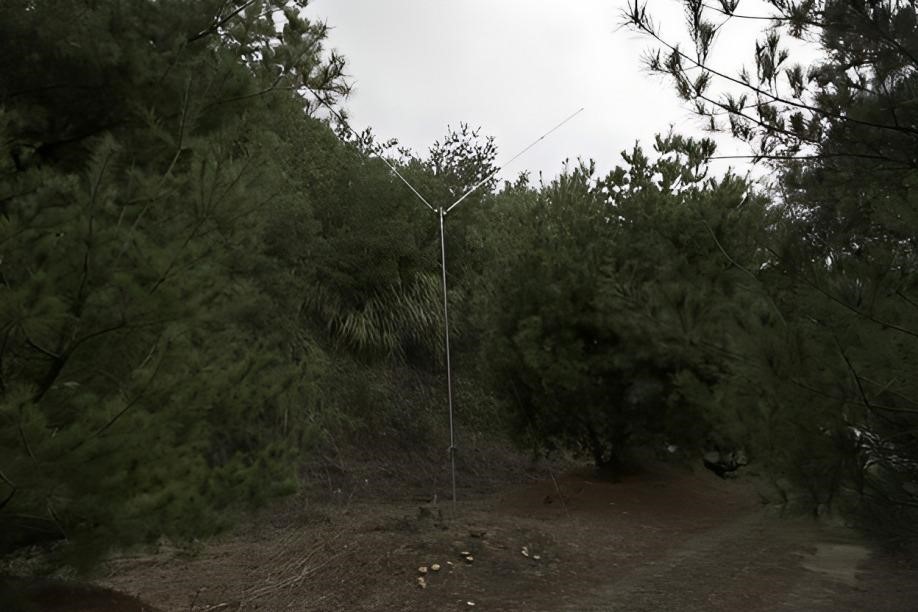
A Hundred Seagulls Shatter China’s Sky Blockage: Two Decades in the Making: the Miraculous Journey of a radio company (Part 2)

See part one here.
One of the first seagull transmission towers
was built in the mountains of Pingtung in southeastern Taiwan. To build a
seagull radio station, a large piece of land with high elevation is a must. So,
it is often built on or near a mountain top. The first step is to have enough
donated funds to rent the land.
The installation site is often off the beaten path in the high mountains. The volunteers must carry all the construction materials and equipment on their backs and hike up the mountains, wading through poisonous snake infested paths. It takes dozens of days to build up one seagull tower and station.
The signal pointing process was also riddled with difficulties. Since there was no precedence, everything had to be done from scratch. After lots of trial and error, the seagull station in Pingtung was finally ready. As if with divine intervention, its signal was able to reach as far as China’s northwestern corner--Xinjiang. It was the best reward for the hardworking volunteers.
After that, many more seagull stations were installed in Taiwan, forming a broadcasting network to mainland China. Behind each station is a story. From finding and leasing the land, to installation, testing, and maintenance, not a single penny was from any government, but from SOH volunteers’ paychecks or savings.


Mr. Hsieh, a Taiwanese volunteer said: The mainland is my hometown. My father came to Taiwan from there. I hope to do my part to make my hometown better, so that the people will no longer be deceived by the Chinese Communist Party's brainwashing. I hope that one day freedom will return to my hometown, and I can go back.
Compared to Taiwan, where the climate is warm, northwest of China presents a different story when it comes to building a radio towers. The radio stations are often set up in the wilderness and because of the harsh climate, they require more maintenance and frequent part replacements. So someone must be stationed there to "watch over the seagulls." But how can people live in places with no water, no electricity, no housing? In addition to needing donations, it’s difficult to find someone willing to live there just to watch over the radio stations.
One couple chose to be the "seagull guardians." They gave up their jobs and moved to the site of a seagull station.
Their lives are filled with the most primitive challenges. The kitchen is a pit on the ground, along with some firewood and a pot hanging from a few iron rods. From the tent where they sleep, they can hear the whistling northern wind and the howling of the wolves. All they see around them is year-round snow. There is no social life. They managed to survive and even raised a child.
Because of the harsh conditions, SOH headquarters advised them to give up the radio station and move back home, but they said no. Why? They said, "This is our mission".
The above are just two examples of seagull watchers. In fact, behind every seagull station, there is a touching story.
As the story continued to unfold, more and more seagull radio stations were established from Taiwan to the Tibetan Plateau, from the open grasslands to the humid rainforests. SOH now operates more than one hundred seagull towers occupying different frequency bands.
The coverage and clarity of SOH’s broadcast signal to China exceeds that of most government-funded national radio stations. With clarity, integrity, and continuity, the SOH towers transmit truthful information to Chinese people behind the Iron Curtain.
But then, the seagull station volunteers faced new challenges.
When the Chinese Communist Party was unable to stop these shortwave stations in the air, they switched their tactics, pressuring the countries where seagull stations are located through diplomatic relations, forcing those governments to remove these stations.
In the mountains of northern Vietnam, two young men set up 12 seagull radio stations in April 2009. These stations broadcast 18 hours of radio programs a day to Southern China. The two men also developed an advanced technology that can detect the jamming signals and instantly "drift" to a neighboring frequency to continue broadcasting. When the jamming signal follows, it will immediately drift away again. The entire process is automatically done by the computer, making such a radio station "a flying seagull that can never be caught."
In 2010, the Vietnamese government, under the pressure from the CCP, raided a seagull base station, dismantled all twelve radio towers, and arrested the two men, Trung Vu and Thanh Le. They each were given 3 years sentence in 2011.
Before he was arrested, Trung Vu made a good living as the owner of a technology company with over 100 employees. Because of this arrest, Vu not only lost his freedom, but also his company, his weath, and his family.
After Vu finished his prison term, he came to the U.S. and applied for political asylum. When asked if given the opportunity, would you do it again, Vu said that he would do it again, "because it was the right thing to do."
In 2018, Mr. Chiang, a Taiwanese corporate executive based in Thailand, helped to set up a seagull radio station in Chiang Mai, Thailand. But in November that year, Chiang was arrested and later given prison sentence by the Thai authorities, who was pressured by the CCP. Chiang eventually returned to Taiwan, but he was demoted and suffered a lot of hardships. However, he never regretted what he had done for SOH’s seagull network.
What gives SOH volunteers the courage to do what they do even if it costs their income, comfort, or freedom? It is because they deeply understand that every person in China longs for freedom; and the best thing to give to the Chinese people is a continuous stream of truthful information.
Even though it is more difficult to influence the Taiwanese government, the CCP still managed to attack the SOH radio stations using the CCP agents, who reported to the authority of "unlicensed broadcasting" activities. Mr. Xie, a restaurant owner, is a volunteer of the seagull network. He was suddenly arrested while cooking in his restaurant one day and the radio equipment was confiscated. After this incident, SOH supporters and volunteers in Taiwan started to talk to the related government agencies about the necessity and positive aspects of broadcasting to China, from the Tianma shortwave radio station established by President Chiang Ching-kuo in the old days to the SOH seagull Radio of today, and to the persecution of faith-based groups taking place in the mainland. They talked about Taiwan’s mission and importance.
These efforts paid off. Taiwan's bipartisan
legislators began to work together to legalize civilian transmission towers.
Eventually a bill was passed to protect the rights of private radio stations.

Volunteers of SOH in almost every country face similar interference from the CCP, just to different extents. They not only must win the frequency battle in the air, but also the public relations and legal battles on the ground. The energy and finances it take is immeasurable.
So, what has been the effect of the seagull network?
The third part of the story is available here.
*****
Sound of Hope Radio Network (SOH) is a nonprofit organization with 501(c)(3) status. Every $20 donation can give China five minutes of truth.
Watch the video on the homepage: https://freedomforchina.org
Donation & Info Phone: 888-851-2128
Thank you for your generosity!

